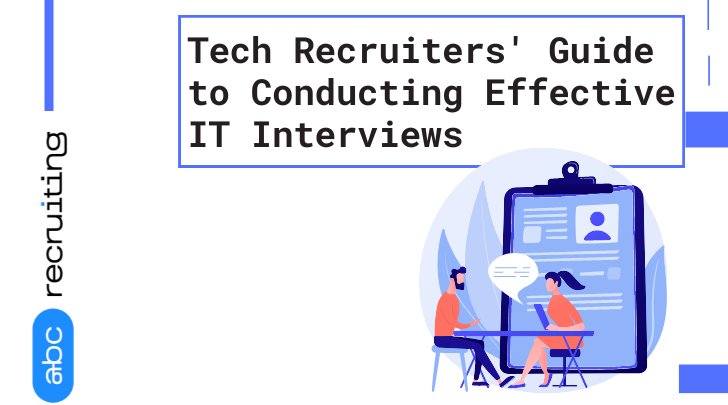As a tech recruiter, you know the importance of finding the perfect candidate for your open IT positions. And when it comes to getting the perfect hire, interviews are undeniably one of the most crucial steps in the process.
The key to successful tech recruiting is being able to select the best and brightest IT professionals for every position. And that means knowing how to conduct effective IT interviews that go beyond just asking basic questions about coding and programming.
From selecting the right questions to asking targeted follow-ups and using in-depth assessments, there’s a lot that goes into making sure each candidate is a perfect fit for your role. In this guide, we'll detail best practices on conducting effective IT interviews while helping you find and hire top talent every time.
Preparing for the Interview
Preparing for an IT interview can be a lot of work. But by taking the right approach, you can make sure you’ll attract the best candidates and find the right fit for your technical teams.
So, what steps should you take? Well, here are some best practices to help you get started:
- Get organized. Gather all of your documents, resources and notes that you need for the interview and have them close at hand. You don’t want to be looking for something during an interview.
- Plan ahead. Research the candidate’s background and have a list of questions prepared so that you can compare candidates objectively.
- Ask relevant questions. Make sure the questions are job related and focus on technical skills as well as communication skills and ability to work in a team environment.
- Be flexible. If certain answers stray off topic or to other areas, don’t be afraid to explore these deeper conversations—it can provide valuable insights into the candidate’s background and experience.
By taking these steps before an IT interview, your recruitment process will run smoothly and efficiently, helping ensure that all candidates get a fair chance at success.
Developing an Interview Structure
When it comes to hiring for IT positions, having a structured interviewing process is essential for making sure that you get the best candidate for the job. To begin, take some time to craft thoughtful and meaningful questions that will help you get a clear snapshot of the candidate's skills and experience. This could include how they troubleshoot challenges, their experience in desired technologies, or how they would handle real-life scenarios.
For an effective and efficient interview structure, it's best to plan ahead. Think about what type of questions you want to ask your candidates, as well as how long it will take to assess their answers. For example, consider dividing the process into three parts: a technical skills assessment (approximately 30 minutes); a formal Q&A session (around 20 minutes); and finally, leaving enough time at the end for any further questions either party might have (10 minutes).
By taking the time to plan out your interviewing process, you'll ensure that everyone involved is on the same page when it comes to completing the interview in an orderly fashion. That way, you can rest assured you're getting everything you need from each candidate before making your final decision.
Finding the Right Questions to Ask
Figuring out the best questions to ask potential IT candidates during interviews is an art form that can be a challenge for hiring managers. Just like you would prepare for any meeting, putting thought and effort into interviewing will make it easier to find the right person for the job.
Here are some tips for finding the right questions to ask during an IT interview:
- Know what you’re looking for – Before you start conducting interviews, make sure you have a clear idea of what you’re looking for in the candidate. Do you need someone with specific technical skills? Or someone who can work with multiple teams? Having a clear picture of your needs before the interview will help you craft better questions.
- Do your research – Researching extensively on new technologies and trends related to your current job opening can help you identify emerging trends in software engineering, project management or other IT-related fields. This ensures that your questions measure candidates' aptitude in skills that are relevant to the job.
- Aim to understand each candidate’s unique context - Experienced recruiters know that there is no "one size fits all" approach when it comes to interviewing successful candidates for an IT role—it's about finding someone who will fit successfully into your team culture and understands your workflow cycle and context of operations. Try to get a sense of how each candidate interacts with complex situations—including problem solving, and leadership—by asking them open-ended questions about their past experiences working on teams or initiatives which have had varying levels of success by drawing from their personal experience.
Conclusion
So there you have it, the best practices to ensure your IT recruitment process goes as smoothly as possible. From the moment the candidate walks in the door to the minute you follow up, it is important to be as organized and efficient as possible. Remember to ask the right questions, take notes, use video interviewing, and provide the candidate with timely feedback. When done right, you’ll be sure to get the best talent the IT industry has to offer.
By following the tips and best practices outlined in this guide, you can make sure your next IT recruitment process is a success. Good luck!




